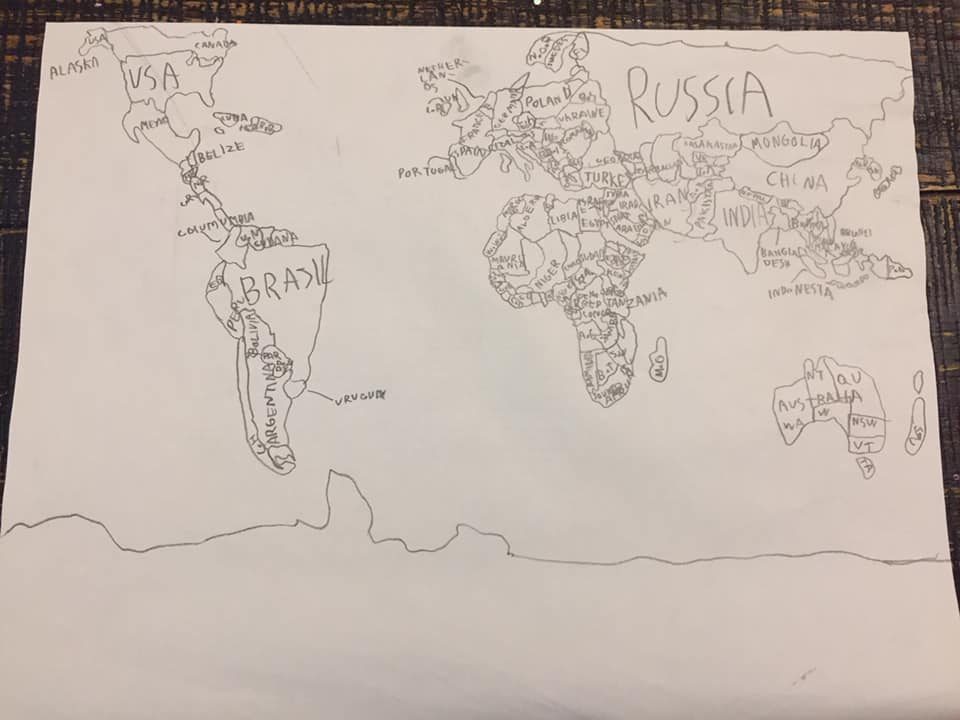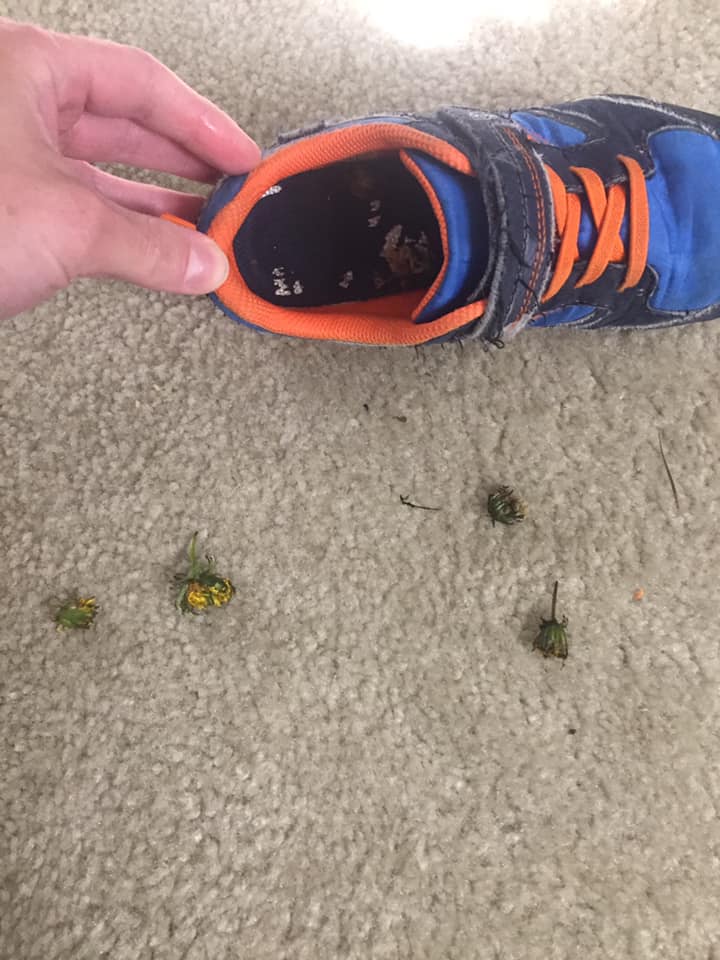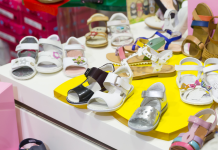April in Autism Awareness Month. To be completely transparent, when I first sat down to write about this, I considered which “acceptable” topics I might discuss, i.e. those that inspire but don’t push any buttons or those that educate but are careful to include all experiences.
But I couldn’t write about those things. They felt too generic and seemed to lack honesty. I think that’s because there is still so much misinformation and disagreement about what autism is, how it presents, and how it should be represented. Any parent who has a child on the autism spectrum is well aware that the internet has many opinions on functioning labels, puzzle pieces, the color blue, treatments, and the verbiage that is used.
I cannot please everyone, and the only thing I can do is speak from our personal experiences. Truly, every single individual diagnosed with autism is different and has diverse strengths and struggles–just as every neurotypical person is different, with their own positive attributes and shortcomings. My hope is that this month, all of the individual autistic experiences are heard and understood. This is ours alone.
The Space in Between
I made a local friend here in Birmingham when we first moved to the area last year. I reached out to her because I found her blog, which details her journey with her autistic son and special needs parenting. Having moved from a small town in Ohio, I was so eager to live in a bigger city where I could meet more families with neurodivergent kids or kids with special needs so I didn’t feel so alone.
Over the last year, the blogger mom and I have become good friends and we’ve shared a lot of stories and experiences. We were at a playground together recently when she asked me, “Do you ever sometimes forget that he (my son) has autism?”
My answer was “yes, absolutely.” Because this is true. Sometimes I do forget–and then it becomes clear again an hour later. That’s pretty much the story of our lives. My son straddles this line between what “seems like” a neurotypical child and what “might seem like” an autistic child (based on an average person’s understanding and perception). It’s been that way since the beginning, and I never know where he, or we, belong. You see, even though it’s a month to bring awareness to autism –a diagnosis my son in fact has– sometimes I shy away from discussing his autism. I feel like I shouldn’t; I feel like I’m taking away from children who have higher support needs, or even more challenges day to day, despite the fact that we’ve had our own challenges that have felt completely insurmountable at times.
My son is considered “high to very-high functioning” by most people. And as some of you reading might already know, functioning labels are no longer used. It’s all just the autism spectrum, and it’s huge– so huge that, truthfully, it can be hard for most to comprehend. The reasoning makes sense, though: even though my son straddles this imaginary line, there are absolutely days where he seems “high functioning” and days where he absolutely does not. Sometimes, his ability to function well can change from hour to hour or even minute to minute.
I recently read on Facebook that autism is a “dynamic disability”. This basically means that functioning might fluctuate depending on factors such as the following: environment, cognition, executive function, processing capacity, interoception, anxiety, sensory overwhelm, burnout, and other things. In short, an autistic person might be capable of a task one day, but not the same task the next. (Neurodiversity Unbroken, 2021)
When I read this, the “lightbulb” went off and that’s what I knew I needed to write about. It explains our life, and my son, so perfectly. And in the spirit of autism awareness and acceptance, the biggest things I ask from you are simple: kindness and compassion (not sympathy, please, because my kid is freakin’ amazing), as well as a non-judgmental attitude. This goes for ANY child, but especially a child who might “seem typical” to you…but then unexpectedly acts or reacts in ways you would not expect from a typically-developing child of that age. Please, have grace. Show kindness. It really is that simple.
I say those things with a bit of a broken spirit, because over the years, I’ve had several encounters that were more assuming than kind, more judgmental than compassionate. I understand that it can be a complicated expectation, but I suppose I want others to both “get” my son’s differences but not see him only through that lens–to practice understanding in his moments of struggle but still focus on his strengths and gifts.
Talk about not asking for too much, huh?
A special, amazing boy and a diagnosis
My son never had red flags of autism based on those toddler developmental questionnaires every parent is supposed to fill out at the pediatrician’s office. He “passed” them all.
He spoke his first word at 9 months; he was speaking in complete sentences a year before most of his peers. He crawled and walked at a slower pace but still within the range of “normal”; he laughed and giggled sometimes; he made some eye contact.
From a pediatrician’s standpoint, what was I worried about?
The day (literally, the DAY) he was born, he cried non-stop. I asked a nurse if this was normal for a newborn baby and she said, “for some, yes.” I quickly found out that she was lying to me, as not to overwhelm a brand new mom. My baby screamed and cried 90% of his waking hours from birth to six months. He slept a mere 1-2 solid hours a day as an infant, and no, that’s not an exaggeration because I barely survived to tell it. I was told “it’s just colic.” He could rarely be consoled. We resorted to bedsharing because it’s the only thing that helped him sleep at all. He was exclusively breastfed (aka no solids or bottles at all) beyond a year of age because he refused food and all bottles. It was the hardest year as a new mom I could have imagined, well beyond the kind of hard one expects with a newborn.
Still, what was I worried about? And clearly it was my fault — I “needed to leave him with other people,” “stop breastfeeding,” said the pediatricians.
Before turning 3, we knew this kid was different–really unique and bright. He was writing all letters and numbers at 2 years old, and he had an insatiable desire to LEARN everything! It was incredible. He was even frequently affectionate and thoughtful (something people think isn’t true of autistic people, but they’re wrong). And yet, what people didn’t see is the huge meltdowns happening at home and sometimes in public, how something small could trigger high-pitched screaming and no ability to calm down, even in a public space. These were meltdowns well beyond what I saw our friends experiencing with their typical 3 year olds. I felt like a terrible parent; again, clearly I was doing something wrong.
And again, what was I worried about? “He’s just a challenging kid; he’ll outgrow it.” “He’s so smart that he gets frustrated when he can’t do all the things he wants to do.”
So I held onto that for awhile and waited. And waited some more. I thought, “Okay, he’s 4 now. Why hasn’t he outgrown these frequent tantrums and huge meltdowns, these apparent overreactions to everything?” And there were other signs. He had special interests (always academic and impressive in nature); he lined things up and had OCD-like behaviors toward organization; he was easily frustrated by small changes; he had sensory issues surrounding water and clothing. But he was verbally impressive, incredibly bright, kind to others, and could hold it together at preschool.
And so, what was I worried about?
You guessed it — still, the pediatricians just told me he was a very bright boy and his emotional/social development would come a bit later.
I was done listening to them. I KNEW in my momma heart that this was not just asynchronous development. I had to take it upon myself to book an appointment with an autism clinic. They told me that same day that he was autistic, with a low level of autism-related symptoms on the ADOS. We were told, “This would have been called Asperger’s, but now it’s all Autism”. And in the months following, we even received a second opinion from a well-respected psychologist in another city. Guess what? Still autistic. But again, even she told us, “he’s so high-functioning that he’ll be fine by middle school.”
You see, the space in between is where my son seems to exist — often knowing or being told he’s different and needs some help but that “he’s high-functioning.” Until he’s not.
And this is what I need people to understand, I guess. For us, sometimes autism feels like a gift and other times it feels like a disability. That’s why kindness and compassion are key. Because I need people to understand that my child, and children like him, may seem like your child on one day, but not at all on the next. And as he’s gotten older, he can hide his struggles a little better in public (“masking” it’s called), but he still shows them at home and when overloaded or overwhelmed.
The space in between
He’s 6 now. He works really hard at school to be the perfect student. He is kind, sweet, and very bright, the teachers say. He earns the top scores on assessments; he loves to read and write his own books. He still loves to learn everything he can get his hands on.
And yet, sometimes (more often than not) after school, he is filled with anxiety and has meltdowns. Sometimes small, sometimes big. It’s like the coke bottle effect. The pressure builds up all day at school, until he lets it out when he’s home. (And this is something we are working on with his amazing school. We are thankful to now be in a district that understands his needs vs. the parent-shaming we experienced in his previous district).
The space in between
If my child is awake, he’s learning — teaching himself, really — reading, writing books, or taking notes. Yes, he’s barely 6! Currently, he’s really interested in geography and animals. He can spend HOURS upon HOURS a day learning about these things. This is a gift I believe my son has because of his autism, not in spite of it. His memory is a thing to behold, and his love for knowledge is never-ending.

And yet, he struggles with relating to his peers and engaging in their interests. He can enjoy a playground or kids’ activity for a short time, but then wants to leave or is overstimulated by it. And he’s ready to get back home to his books again. Play dates and birthday parties can be hard, and we often turn down invitations.
The space in between
My child is 6 going on 60, some say. He’s knowledgeable and complex in ways well beyond his years. A pediatrician has compared him to Bill Gates and Elon Musk; she said he was born to change the world. I agree.
And yet, like many kids on the spectrum, his social and emotional skills lag behind by years. His reactions and emotional responses seem more like a 3 year old’s than that of a Kindergartener. Onlookers might not always be understanding when a 6 year old is having a “fit” over a minute issue, even though they might extend more empathy toward a preschooler exhibiting the same behavior.
The space in between
My child is so incredibly thoughtful and sweet. There’s this assumption that kids on the spectrum aren’t affectionate or thoughtful, and that’s absolutely not true. In fact, it’s often wrong. My child loves to cuddle and read together, and he’s always thinking of his family. Just this week, he’s been picking flowers at recess, hiding them in his shoes/clothes and bringing them home to me after school! His thoughtfulness is genuine and heart-melting.

And yet, he can be impulsive and behaviorally challenging in ways that are difficult for some to understand. It’s (usually) not an issue of parenting or discipline or boundaries. The reasons are complex. What might look like “bad behavior” often stems from anxiety and overwhelm for kids on the spectrum, or ADHD which is a common comorbid disorder. My child is still learning how to regulate himself. It’s a work in progress, and progress has certainly been made with many variables coming together.
The space in between.
We are not your “typical” family, and my child is not your typical child. In fact, he’s so much more than that. He’s really, really amazing. He’s the kind of unique that will change our world; he’s talented, sweet, and funny. But he also has an invisible disability that may or may not seem apparent in any given situation, at any time. He is autistic, and I hope he grows up to know that while he experiences the world differently, he is perfect and has a unique perspective and skillset to offer. I hope he grows up to know that he’s just as capable and deserving of happiness, love, and friendship. I also hope that he will continue to gain skills and strategies that allow him to be successful in all aspects of life. For now, during Autism Awareness Month, all I ask of you is the same: kindness and compassion. Disabilities aren’t always obvious and they certainly don’t always have a look. They can even be part of a sweet, smart, and kind little boy who is just working extra hard to live in and thrive in a world that wasn’t exactly made for him.











